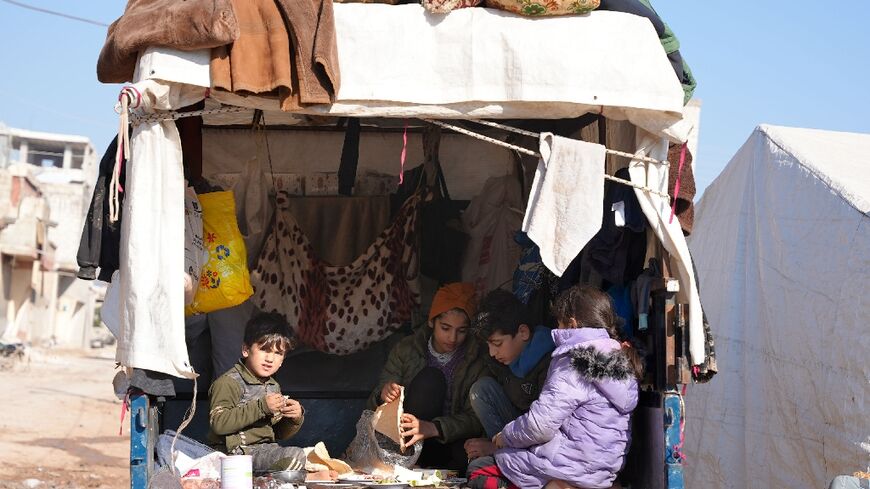
A Syrian family has sheltered inside a small truck since the deadly February 6 earthquake hit Turkey and Syria - Rami al SAYED
by RAMI AL-SAYED
February 16, 2023 — Jindayris (Syria) (AFP)
Since the earthquake destroyed her home, Syrian teacher Suzanne Abdallah has lived in a small truck crammed with her family members, just a stone's throw from where their house stood.
"Ten of us pile into this truck. We sleep sitting up," said the 42-year-old, wearing multiple layers of clothes and a wooled scarf wrapped around her head against the biting winter cold.
Her infant boy was sleeping in a makeshift hammock made from a blanket that was swinging from the packed vehicle's roof, as seven other children were sharing a basic breakfast inside.
"Conditions are difficult, especially as I have a toddler," said Abdallah. "I woke up this morning and found his hands were extremely cold, so I put him in the sun to warm him.
"We want a shelter; we need help for the sake of the little children."
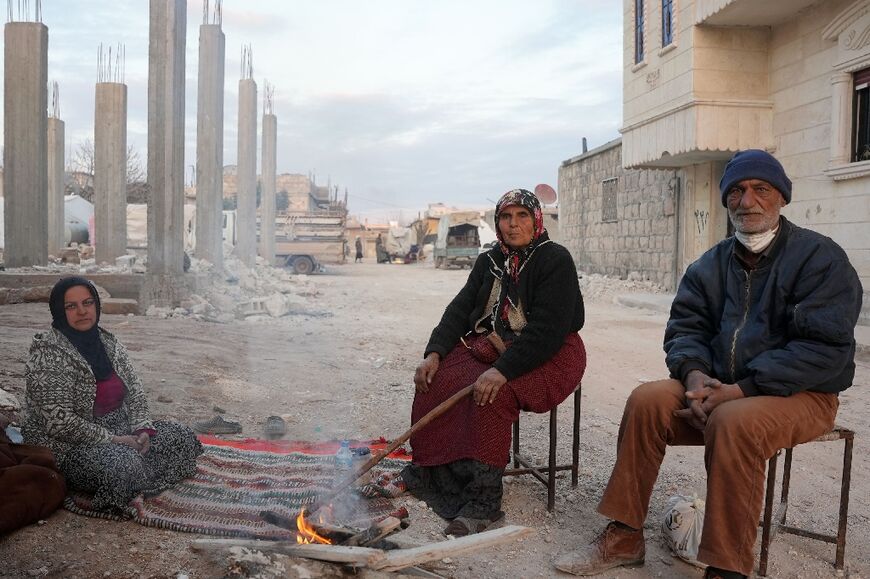
Abdallah and her family are among several million Syrians made homeless, according to UN estimates, by the 7.8-magnitude quake that also devastated vast areas of Turkey.
More than 40,000 people were killed across the two countries by the February 6 disaster that flattened entire districts, including in Abdallah's home city of Jindayris on the Turkish border.
Syria's people have endured more than a decade of brutal civil war, and many fled to the rebel-held Idlib province from other regions now under the control of President Bashar al-Assad's forces.
Survivors of the powerful quake have since huddled in whatever places they could find, many sleeping in tents and vehicles, others huddling around fires outside.
- 'Lives are tragic' -
Abdallah's father-in-law turned his vehicle into a makeshift home for his sons and their families, covering the top of the truck with blankets and rugs for added insulation.
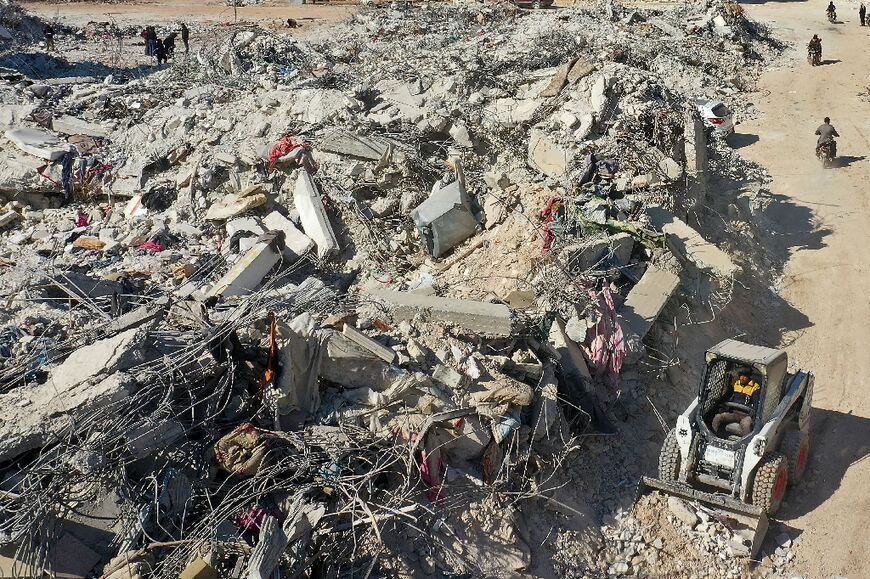
"Living in a car is difficult; we are two households," Abdallah told AFP.
Around here, much of the district has been reduced to rubble, from which rescuers from the White Helmets group recovered more than 500 bodies.
Jindayris is among the cities worst-hit by the quake that killed more than 3,600 people across five Syrian provinces, claiming the highest death tolls in Idlib and Aleppo.
Families here have slept in schools, mosques and displacement camps or in basic shelters built in open spaces such as olive groves and public squares.
Across the town, the families of retired employee Abdelrahman Haji Ahmed and his neighbours now live in makeshift tents pitched in the middle of their demolished street.
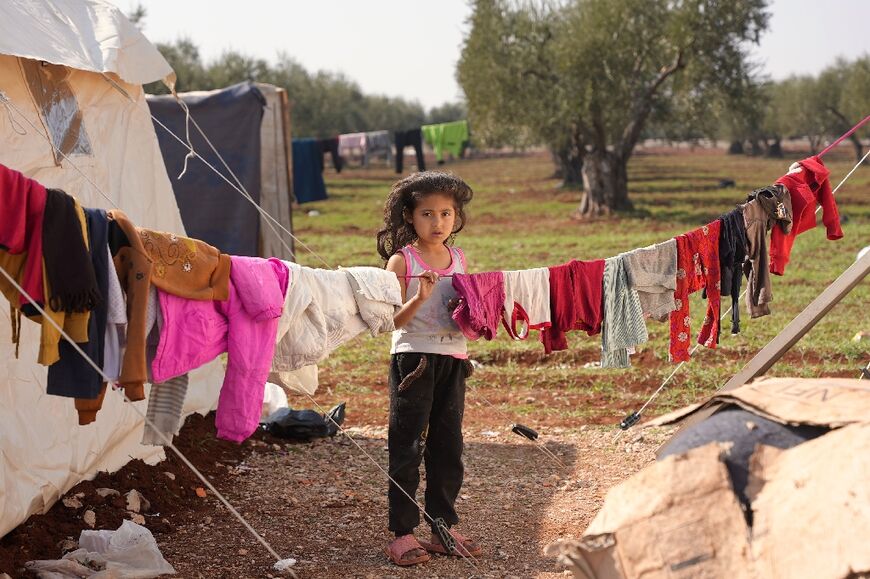
At night, the women and children huddle inside them, under tattered plastic sheets and blankets, while Ahmed and the other men sleep under the stars.
"There is no electricity, no water, no sanitation," he told AFP, his ruined former home behind him. "The lives of all the families are tragic."
Ahmed held his little daughter, watched on by other children, and said that right now all his family needs is "one or two tents so that the families can rest.
"Then we will see what to do next, but this is what we ask for now," he added. "We are not thinking about the future. The situation we are in now does not allow it."
- 'No longer tolerable' -
Some international aid has arrived in the region, including in truck convoys that crossed the Turkish borders, but many here remain in desperate need.
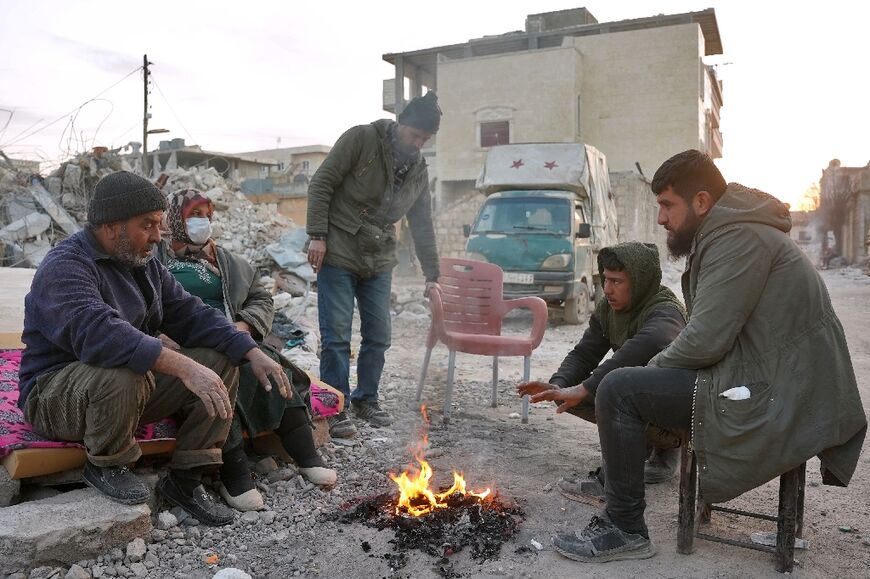
The UN Office for the Coordination of Humanitarian Affairs says shelters are among the top priority needs, along with emergency food, heating and hygiene facilities.
The UN children's agency UNICEF stresses the urgent need for "access to safe drinking water and sanitation services, which are critical in preventing illness" following the quake.
In another camp, on the outskirts of Jindayris, 63-year-old Khawthar al-Shaqi now lives with her daughter and grandchildren after spending the first four nights in the open.
"We took refuge in the camp where we could find a shelter," said Shaqi, who years ago fled her home city of Homs and says she now lacks the means to meet even their most basic needs.
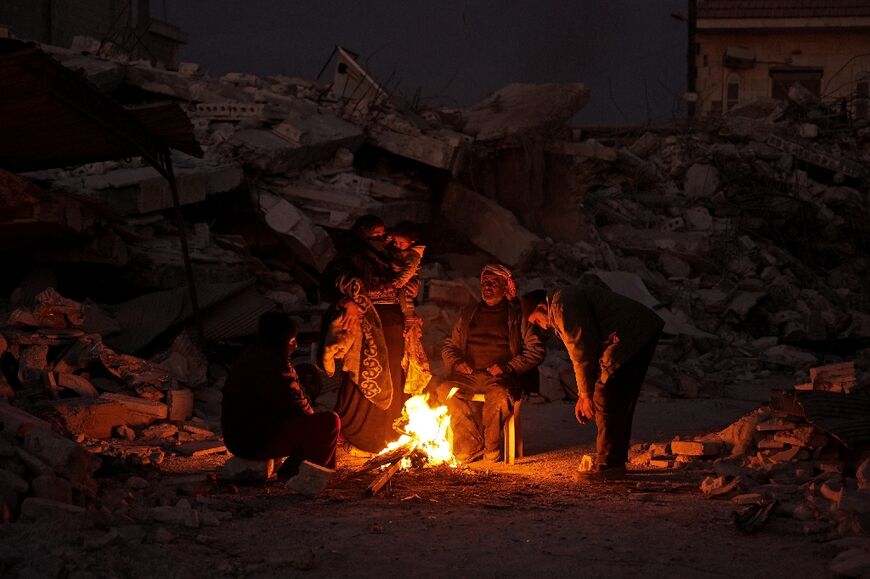
"We cannot afford to buy a bottle of water or clothes," she said as the little children played outside the tent. "If we want to go to the city, we do not have transportation or money."
"Conditions are no longer tolerable and we don't know what to do with the children. Here we are sitting in the cold... We have nothing but God's mercy."
Syria's Assad thanks 'Arab brothers' for quake aid
Issued on: 16/02/2023 - 20:50Modified: 16/02/2023 - 20:48
Damascus (AFP) – Syrian President Bashar al-Assad on Thursday thanked his "Arab brothers" for aid supplied following last week's deadly earthquake, that saw countries in the region break with years of diplomatic silence.
The 7.8-magnitude quake hit Turkey and Syria on February 6, leaving a combined death toll of nearly 40,000 people.
Since then, Assad has received calls from the leaders of several Arab countries, including those that cut off ties with Syria over a decade ago over bloodshed during its civil war.
Some 120 planes laden with assistance have also landed in the country's airports, about half of them from the United Arab Emirates, which restored ties with Syria in late 2018.
"We cannot overlook expressing thanks to all the countries that stood by us since the first hours of the disaster from among our Arab brothers and our friends," Assad said, during a televised speech Thursday.
"Their aid had a major impact on enhancing our ability to confront the difficult conditions at critical hours," he continued.
At least 3,600 Syrians died in the quake, which came nearly 12 years into the country's civil war -- that has devastated swathes of the country, killed nearly half a million people and displaced millions more.
"The size of the catastrophe and the tasks that fall upon us are much greater than the available capacities," Assad said, adding that the country would continue to face deep social and economic challenges for years to come.
Aid efforts to Syria have been led by the UAE, which has been at the forefront of moves to break Damascus's isolation and bring it back into the Arab fold.
But the disaster also saw Saudi Arabia send two planes carrying aid to Syria since Tuesday -- a first in more than a decade.
Assad has also met the foreign ministers of the UAE and Jordan in Damascus, as well as receiving calls from the leaders of Egypt, Bahrain and Jordan.
© 2023 AFP
Issued on: 16/02/2023 - 20:50Modified: 16/02/2023 - 20:48
Damascus (AFP) – Syrian President Bashar al-Assad on Thursday thanked his "Arab brothers" for aid supplied following last week's deadly earthquake, that saw countries in the region break with years of diplomatic silence.
The 7.8-magnitude quake hit Turkey and Syria on February 6, leaving a combined death toll of nearly 40,000 people.
Since then, Assad has received calls from the leaders of several Arab countries, including those that cut off ties with Syria over a decade ago over bloodshed during its civil war.
Some 120 planes laden with assistance have also landed in the country's airports, about half of them from the United Arab Emirates, which restored ties with Syria in late 2018.
"We cannot overlook expressing thanks to all the countries that stood by us since the first hours of the disaster from among our Arab brothers and our friends," Assad said, during a televised speech Thursday.
"Their aid had a major impact on enhancing our ability to confront the difficult conditions at critical hours," he continued.
At least 3,600 Syrians died in the quake, which came nearly 12 years into the country's civil war -- that has devastated swathes of the country, killed nearly half a million people and displaced millions more.
"The size of the catastrophe and the tasks that fall upon us are much greater than the available capacities," Assad said, adding that the country would continue to face deep social and economic challenges for years to come.
Aid efforts to Syria have been led by the UAE, which has been at the forefront of moves to break Damascus's isolation and bring it back into the Arab fold.
But the disaster also saw Saudi Arabia send two planes carrying aid to Syria since Tuesday -- a first in more than a decade.
Assad has also met the foreign ministers of the UAE and Jordan in Damascus, as well as receiving calls from the leaders of Egypt, Bahrain and Jordan.
© 2023 AFP
No comments:
Post a Comment